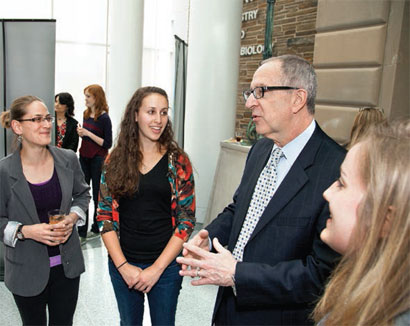Balancing academics and extracurricular activities
Once each semester I arrive on campus especially early to have breakfast with members of the “400 Club.” At our breakfast last spring, we honored seventy-two athletes, representing twenty-nine teams, who had earned a 4.0 or better grade-point average during the spring semester and fifty-seven who qualified during the fall. In July a recent 400 Club member—Taylor Goetzinger ’12—was one of three former Big Red rowers to help earn gold medals for the U.S. at the 2012 World Rowing Under 23 Championship in Lithuania. In addition, many students compete on club teams—some of which have enjoyed success at the national level.
High levels of achievement in academics and extracurricular activities require determination, focus, and discipline, and the success of student-athletes is just the tip of the iceberg. College students today—and this is particularly true at competitive schools like Cornell—must become masters at balancing multiple commitments, a skill that will serve them well later in life.
Last year more than 7,000 undergraduates—athletes and non-athletes—were on the Cornell payroll, and many others held off-campus jobs. Students receiving need-based financial aid (roughly half of our undergraduates) engage in work study as part of their aid packages. Our peer institutions also have earnings expectations for many of their financial aid recipients.

Beyond athletics and paid employment, Cornell students participated in more than 1,000 recognized student groups last year, ranging from the Teszia Belly Dance Troupe to the Wall Street Club. Several times each year, the editors of the Cornell Daily Sun and I discuss campus issues, potential article ideas, and the column I write for the Sun every other month. I have been most impressed by the commitment and long hours that Sun editors bring to their journalistic activities.
Similarly, the Cornell Chorus and Glee Club and students in other musical groups devote untold hours to practice, performance, and travel. The Glee Club spent two weeks in the United Kingdom last summer, winning second place among male voice choirs at an international competition in Wales, and it is already gearing up for a Southeastern U.S. tour in January 2013. Many undergraduates put significant time and energy into their fraternities and sororities and into improving the Greek system at Cornell and nationally.
Reflecting Cornell’s commitment to public engagement and our land-grant mission, our students contribute an impressive 400,000 hours of community service each year through the Public Service Center (PSC) and other campus organizations. Faculty members encourage this involvement with service learning courses, some of which include service abroad. And the new Center for Community Engaged Learning and Research, supported by the Einhorn Family Charitable Trust, is a university-wide center designed to facilitate such courses as well as community-based research and public scholarship across a wide spectrum of academic disciplines and programs.
The Community Partnership Board, a student organization, makes grants to other student groups for grassroots community action projects. Our Let’s Get Ready program, a collaboration of the PSC, the Ithaca Youth Bureau, and the Village at Ithaca that involves undergraduates as tutors, recently won a national award for helping high school students from disadvantaged backgrounds prepare for college. The Cornell Tradition, an alumni-funded program that awards fellowships to undergraduates who work, do campus and/or community service, and get good grades, also makes available to each Tradition Fellow up to $3,500 to cover the cost of service-related activities and other educational endeavors.
I invite you to learn even more about our current students and to attend Cornell athletic events and student performances. I know you will be impressed by how their energy, talent, and commitment yield benefits for the Cornell community and the world at large. And I hope that you will continue to participate in some of the activities that gave significance to your own time on the Hill. On January 5, 2013, for example, alumni and students in some thirty cities nationwide will participate in Cornell Cares Day. And throughout the year the PSC’s Cornell Network for Change offers regional events and an online portal listing community-based jobs, internships, events, and other opportunities.
As always, I welcome your ideas about how we can better support our current students and our alumni in leading full and engaged lives.


